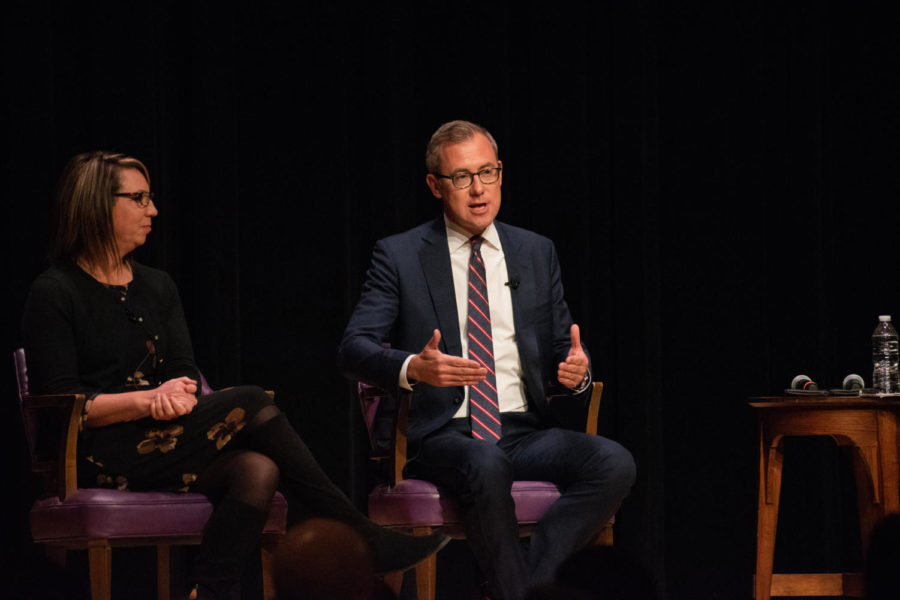Political speakers discuss the political world post midterm elections
November 26, 2018
An attentive crowd gathered to listen to a panel of political speakers discuss the state of American politics after the most recent midterm election Monday in the Great Hall of the Memorial Union.
With political science professor Steffen Schmidt acting as moderator, the panel featured Jeff Zeleny, a CNN senior white house correspondent, Jennifer Jacobs, a Bloomberg senior white house reporter, David Kochel, the national campaign adviser for the 2016 Jeb Bush presidential campaign and Jonathan Martin who is a national political correspondent for The New York Times. Both Jacobs and Kochel are former graduates of Iowa State.
The discussion began on the personal experiences of each panelist during the 2018 elections. Zeleny was surprised at how invested President Trump was in the midterms. He said the president was focused on defeating one candidate especially: John Tester from Montana. Even though there was a lot of effort against him, Tester won by a narrow margin.
“Never before have we seen the president involved in the midterm races,” Zeleny said.
Jacobs added that the president is in his comfort zone while campaigning and remarked about his energy while on the campaign trail despite others tiring out.
Kochel was helping out with several campaigns including Gov. Kim Reynolds and Congressman David Young. His challenge was staying focused on the campaigning during a time in which the media had many challenging stories.
Martin emphasized the role of polarization in politics and how much it is beginning to drive how our government works. Unlike dry political science discussions, he said he believes that a change is taking place because of the partisanship in elections.
“It is real. It is driving politics in this country,” Martin said.
When visiting some of the coffee shops in Iowa, Martin was looking for how people were going to vote. The responses shocked him because many said they were voting for people simply based on their political identity and not necessarily because of values.
When the conversation turned to the expected blue wave, Zeleny said there was a blue wave in terms of house races, citing several seats that turned Democratic after being traditionally Republican for years.
Martin agreed and said that “40 seats is the biggest pickup since the Watergate year.”
Jacobs was less pessimistic, adding, “Maybe more of a blue splash.”
Overall, the panel agreed that demographics and areas of the country are becoming increasingly polarized along party lines making certain areas of the country more staunchly loyal to their party.
“I think it’s much more identity oriented,” Martin said.
When looking to the future, Zeleny posed one question: “Will the Democrats overreach?”
Zeleny said he thinks they probably will which could cause more friction between the parties.
“I don’t see much policy being done,” Zeleny said.
Jacobs said she thinks that a lot of focus in the lame-duck session will be on an attorney general and immigration reform.
Schmidt asked if the Democratic Party was united on many of the key issues like immigration and was met, with Zeleny responding with “Absolutely not.”
Martin said the one thing the Democratic Party is united on is President Trump. Although a push for impeachment would be seen as a political mistake, he didn’t deny its possibility.
Kochel said this would be an interesting focal point because the presidential campaign will become a large focus of the political world soon. Zeleny added that the presidential candidates should avoid too much conversation so soon.
“You don’t want to be the candidate of the winter of 2019,” Kochel said.
Although the panel had additional speculations about the future, Kochel summed up what they all agreed on.
“We can’t predict the future with this president,” Kochel said.







